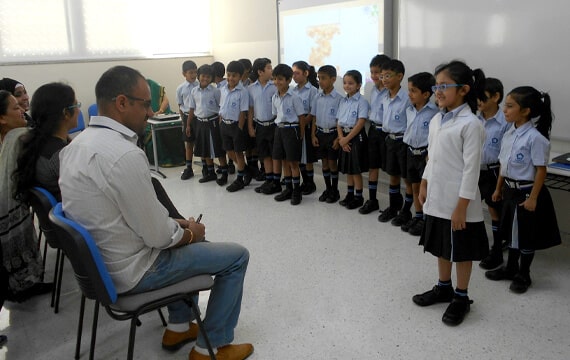Why Good Communication In Early Years is A Key To Success At School
Communication is a vital requirement of everyday life; it helps to build positive relationships, as feelings get expressed, views and knowledge are exchanged, ideas are shared and explained. The ability to communicate effectively is a key skill, and the better we are at it, the better our quality of life will be. If the early childhood setting is language rich ¬-with stories, books, songs and discussions, children will develop into effective and successful communicators. The communication strategy used by children over the first year of life is predominately non-verbal before development progresses to include verbal communication. As a child develops, it is important we nurture their communication skills so they are capable of expressing themselves, clearly and confidently, in all aspects and areas of their life.
Communication in young students occurs in many different ways – the most straightforward and direct being verbal communication. The child communicates first with their parents than with siblings and friends and then with other adults such as their school teachers. A child will learn to communicate by watching and listening to their parents, and then mimicking their words and actions; the more the parents communicate with their child, the earlier and quicker the child will develop these skills. Children who experience positive communication in the early years are more likely to become successful learners, as they are more secure, willing to explore and are able to control their feelings better. Studies have also shown that positive communication with teachers enables better learning and faster reading skills in children. Reading is thus an activity that helps to improve communication proficiency in children; it develops their language acquisition and introduces them to the range of vocabulary, helping them to communicate with ease and clarity. As they get older, reading provides an excellent opportunity for discussion, creating an environment where a child can comfortably and confidently get used to articulating and sharing his ideas and become a good orator.

But communication in pre-schoolers until a child is able to communicate is mostly non-verbal, through body language, gestures, and tone of voice, emotional reactions, and facial expressions or through symbols, like sign language, words or pictures. Through interaction and play with siblings and friends, a child develops social skills and interpersonal skills alongside his communication skills. These skills make him feel at greater comfort in social situations, where he finds it easier to strike up conversations with peers, and make new friends. Through these relationships, the children will also hone their listening skills as well as their ability to empathize and interpret non-verbal communication cues.
It is in the early childhood setting, where children learn the necessary skills to become successful communicators. Thus when children begin school, presentations, class discussions, dramatizations, and oral exams will become regular activities for them, all of which will directly affect their verbal communication skills consequently a child will feel confident, not only speaking in front of a crowd or meeting a new acquaintance, but also be assured in his own ability to converse fluently and make a good impression. The most critical phase for later success in school starts from three years on. This is when coaching and the use of language by adults get most essential to help the child adapt to school life and to the challenges of learning.
As a child gets older the use of words gets refined and grammar is used according to the language used in his/her direct environment. Furthermore, adults constantly providing children with feedback about grammatical mistakes can help children enrich the child’s language development and encourage the correct use of grammar. This feedback is divided into two different methods: “expansion and recast”. The expansion focuses on the adult expanding on two-word sentences of children and role modeling a full sentence with the same content. Recast is the motion where the adult picks up on grammatical mistakes and corrects them immediately.
This communication has to be effective and consistent to have the desired outcome. Developing good communication skills from an early age gives a child greater confidence and success at school and through life. A child who is good at communicating verbally will find it easier to produce written communications and likely perform better in the school exams and written assignments. Therefore good communication has a positive impact on the effectiveness of a successful learning environment extending to personal affective traits such as self -esteem, self- belief, desire, and motivation.



